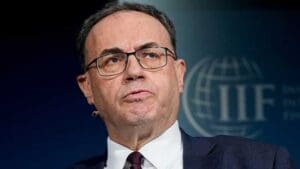
The Bank of England’s ability to set effective interest rates is being hindered by unreliable labour market statistics, according to governor Andrew Bailey, who has highlighted the shortage of accurate data on the UK’s workforce as a “substantial problem.”
Speaking at Mansion House to an audience of City financiers, Bailey voiced his concerns over the Office for National Statistics’ (ONS) failure to obtain sufficient responses for its Labour Force Survey, which has plagued data collection for the past 18 months. This lack of reliable information on employment status has forced the Bank to lean on alternative data measures as it navigates crucial monetary policy decisions.
“Labour Force Survey challenges are widely recognised,” Bailey commented. “It’s a substantial issue – not just for monetary policy – when we lack clear insight into workforce participation. We could certainly benefit from more engagement across the UK with ONS survey efforts.”
Bailey’s remarks underscore his growing frustration with the UK’s inability to maintain robust workforce data. He highlighted that, alongside the Treasury and other key stakeholders, the Bank continues to work closely with the ONS to improve the quality of UK labour data.
While other advanced economies have seen labour market re-entry post-pandemic, the UK has struggled with a decline in labour force participation, a trend Bailey warns could hamper economic performance. The ONS has attempted to address the issue by increasing its survey participants from 44,000 in 2022 to 59,000 this year, though it has cautioned users against relying too heavily on short-term Labour Force Survey data for decision-making.
Bailey emphasised that understanding labour supply dynamics is essential for gauging the UK’s overall economic capacity, which has been further pressured by Brexit-related trade restrictions, energy price shocks, and sluggish investment.
Investment boost for UK economy through isa reform proposed by lord mayor
At the same Mansion House event, Alastair King, lord mayor of London, proposed reforms to the UK’s Individual Savings Accounts (Isas) that would encourage investment in domestic assets. King urged the government to incentivise investors, suggesting that full tax relief could be contingent on funds directed towards UK-focused investments.
“Redirecting funds from non-productive to productive assets could scale up British firms, enhance returns for savers, and broaden market participation,” King stated. His proposal, which he argued would not require additional government funding, aims to align UK practices with those of international counterparts.
Read more:
Bank of England governor highlights ‘substantial problem’ with UK labour data accuracy in Mansion House speech





